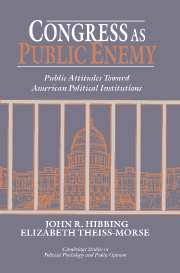Book contents
- Frontmatter
- Contents
- List of figures
- List of tables
- Preface
- CONGRESS AS PUBLIC ENEMY
- 1 Introduction: What is wrong with the American political system?
- 2 Changing levels of support for individual institutions
- 3 Perceptions of political institutions
- 4 Perceptions of congressional features and reforms
- 5 Focus groups and perceptions of the Washington system
- 6 Who approves of Congress?
- 7 Support for democratic processes
- 8 Conclusion: The people and their political system
- Appendix
- References
- Index
3 - Perceptions of political institutions
Published online by Cambridge University Press: 05 August 2012
- Frontmatter
- Contents
- List of figures
- List of tables
- Preface
- CONGRESS AS PUBLIC ENEMY
- 1 Introduction: What is wrong with the American political system?
- 2 Changing levels of support for individual institutions
- 3 Perceptions of political institutions
- 4 Perceptions of congressional features and reforms
- 5 Focus groups and perceptions of the Washington system
- 6 Who approves of Congress?
- 7 Support for democratic processes
- 8 Conclusion: The people and their political system
- Appendix
- References
- Index
Summary
If we know the American public to be fed up, disgusted, and repulsed by Congress and the political system, why should we waste our time explaining public evaluations of political institutions? We already know the whole story, right? Wrong. We actually know very little. Unquestionably, as of the mid-1990s there were plenty of negative feelings toward Congress and government, but saying, for example, that the public “hates” its government is not particularly informative. Hate is an imprecise word, and the U.S. government is an extremely complex entity. Feelings toward some institutions of the government may be quite different from feelings toward others, just as feelings toward aspects of an individual institution may be quite different from feelings toward other aspects of it. Our two major goals in this chapter are to provide a better description of public attitudes than is conveyed in popular accounts and to use this information to begin to sort through what Americans like and dislike in their institutions and why.
But this task is not easily accomplished. For the most part, scholars have lacked the theory and the data necessary to provide a rich portrait of public attitudes toward diverse political institutions. One notable exception is Samuel C. Patterson, Ronald D. Hedlund, and G. Robert Boynton's concerted effort to provide a complete picture of public perceptions of the Iowa state legislature (1975). They conducted an original survey of 1,000 Iowans during the fall of 1966 in which the interviewers posed a fairly detailed set of questions on support for the Iowa legislature.
- Type
- Chapter
- Information
- Congress as Public EnemyPublic Attitudes toward American Political Institutions, pp. 41 - 61Publisher: Cambridge University PressPrint publication year: 1995



